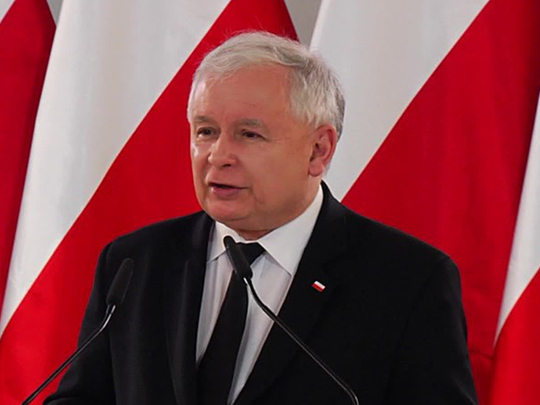
A war is being fought over collective memory in Poland. In the absence of a convincing vision of the future, the ability to control definitions of the past has become one of the most important sources of legitimacy in Polish politics. But if the historicisation of policy is a game played by all sides, the conservative, nationalist right is the most consistent and effective player. Its strategy is well illustrated by the current conflict over the act that enshrines the legal status of the Institute of National Remembrance (IPN).
The government presented the bill as a way to eliminate a discourse about “Polish death camps” during the Holocaust. The government says this discussion falsely accuses Poles of complicity in the murder of three million Polish Jews under Nazi occupation and is spreading throughout the world. The majority of the opposition either abstained or supported the government, with the main objection coming from liberal media where the law was criticised for provisions that introduced historical censorship.
Under the guise of defending the good name of “The Polish Nation” the bill opens the way to criminalising anyone who seeks to reveal dark chapters of Polish history, such as antisemitic pogroms before, during and after the war. But this is a veneer. What is truly at stake is not Poland’s reputation, but Polish nationalist right wing tradition. The ruling Law and Justice party (PiS) makes no secret of the fact that it is part of this tradition. The language and ideas of PiS leaders, as well as their policies towards refugees, minorities and political opposition, draw directly from the rhetoric and strategy of Polish nationalism in the first half of the 20th century.
Before the Second World War the Polish nationalist movement was furiously antisemitic. Organisations including ONR-Falanga, the Camp of Great Poland, the National party and the Camp of National Unity had between them hundreds of thousands of members organised on the model of Italian and German fascists. They organised a boycott of Jewish shops and companies, as well as militias that physically attacked representatives of the community. Between 1935 and 1937 a wave of antisemitic pogroms passed through Poland. The most important centres of antisemitic violence were universities and university cities, which were controlled by the nationalist right. At universities, with the support of their authorities, the “ghetto benches” were introduced, and the number of Jewish students reduced. Those who remained were regularly harassed and beaten.
Anti-Semitic violence spread from cities to the provinces. Areas in which the nationalists’ influence was strong in the 1930s became the most dangerous for Jews during the war and occupation. Marches and boycotts gave way to more deadly attacks. In some places — Jedwabne, Radziow, Wsosz, Szczuczyn — thousands of Jews were murdered by Poles in the summer of 1941. The last phase of the Holocaust (1943-44) saw Jewish “runaways” escaping ghettos hunted and denounced.
Polish anti-Semitism still has a very specific political face. It is the work and the tool of the nationalist right. This is PiS’s history and presents a problem for the party. Restoring this part of our national memory corrupts the image of Poland’s rulers, and so PiS seeks to close the mouths of those historians who remind us of the crimes of Polish nationalism. Jarosaw Kaczynski’s party wants to blur the memory of an important element of its own identity and to purge itself of a murky heritage of pogroms and denunciations.
But that is not all. The more effectively Poland’s rulers can create a collective amnesia, the easier it will be for them to turn this heritage into a present-day reality — by organising a campaign of suspicion towards strangers, spreading hatred towards refugees and feminists, and turning a blind eye to fascists from ONR and All-Polish Youth and the increasing attacks on migrants. While whitewashing its own history, the party seeks to blame its opponents on the left for the crimes of the past. We see this in the prose of the prime minister, Mateusz Morawiecki, when he suggested that the pogrom in Kielce in 1946 was the work of communist provocateurs, and not a population imbued with the propaganda of the National Armed Forces — a nationalist armed organisation that was particularly strong in this region.
And so instead the crimes of the past are represented as features of singular, depraved perpetrators rather than as the consequence of political movements and currents which we continue to see glimpses of today. Cleared of all charges, PiS can now level them at others instead — at the opposition, at critical historians and journalists — and in doing so deprive them of their legitimacy and of their right to participate in the politics of Poland now, and in the future.
— Guardian News & Media Ltd
Przemysaw Wielgosz is editor of Le Monde diplomatique’s Polish edition.









